It was a massive viral trend in 2014, and it is back.
The Ice Bucket Challenge is making its rounds once again on social media, but this time, for mental health.
The idea is to pour a bucket of ice water over your head and nominate someone else to do the same, within 24 hours, to create awareness and get people talking about mental health.
In 2014, the cause was for ALS (amyotrophic lateral sclerosis), a deadly neurodegenerative disease, in which there is no cure.
The challenge helped raise $20 million in Canada.
What spurred it again?
In March, the University of South Carolina posted a video on Instagram about their Spark Your Mind Ice Bucket Challenge, reigniting the old initiative -but with a new purpose.
Since, the challenge has started spreading far and wide.
Welcomed by mental health association
The Canadian Mental Health Association- Nova Scotia division, is not formally affiliated with the 2025 Ice Bucket Challenge, but in a statement to our newsroom, say they are encouraged by the initiative to support mental health.
“It’s heartening to know that Nova Scotians – and people across Atlantic Canada are engaging with the cause and choosing to support CMHA and other community-based mental health organizations,” says Executive Director Johanne Thompson.
“We have seen donations come in and are deeply grateful for the generosity and community spirit behind them.”
Thompson goes on to say that they want to respectfully acknowledge the origins of the Ice Bucket Challenge as a powerful campaign for ALS awareness.
“That legacy is a reminder of how a simple, collective action can spark important conversations and meaningful change. Any initiative that brings mental health into the spotlight – encouraging people to talk about it, support and invest in it – is one we welcome with open arms,” says Thompson.
ALS society hopes for challenge success
The ALS Society for New Brunswick and Nova Scotia says the original Ice Bucket Challenge was a “game changer” for their cause, bringing awareness to the disease.
Kimberley Carter is CEO, and she tells us, prior to 2014 there was one drug to treat ALS and now there are three, with several “in the pipeline” as well as clinical trials.
Carter says, they hope the resurgence of the Ice Bucket Challenge is just as successful for mental health as it was for ALS and the society even participated in the challenge, themselves.
“We understand why people would have concerns about another cause using the Ice Bucket Challenge to raise awareness and funds. I mean, after all, ALS is a rare disease and prior to the original Ice Bucket Challenge, ALS didn’t receive much attention,” says Carter.
“But here’s the thing, no cause owns a fundraising or advocacy strategy. I mean, look at how many walks are out there. We’re not in competition with other causes. They’re all very important. When we lift one another up, we all win.”











